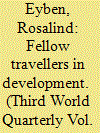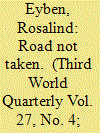| Srl | Item |
| 1 |
ID:
086011


|
|
|
|
|
| Publication |
2009.
|
| Summary/Abstract |
'Women's empowerment', as used by international development organisations, is a fuzzy concept. Historical textual analysis and interviews with officials in development agencies reveal its adaptability and capacity to carry multiple meanings that variously wax and wane in their discursive influence. Today a privileging of instrumentalist meanings of empowerment associated with efficiency and growth are crowding out more socially transformative meanings associated with rights and collective action. In their efforts to make headway in what has become an unfavourable policy environment, officials in development agencies with a commitment to a broader social change agenda juggle these different meanings, strategically exploiting the concept's polysemic nature to keep that agenda alive. We argue for a politics of solidarity between such officials and feminist activists. We encourage the latter to challenge the prevailing instrumentalist discourse of empowerment with a clear, well articulated call for social transformation, while alerting them to how those with the same agenda within international development agencies may well be choosing their words with care, even if what they say appears fuzzy.
|
|
|
|
|
|
|
|
|
|
|
|
|
|
|
|
| 2 |
ID:
116856


|
|
|
|
|
| Publication |
2012.
|
| Summary/Abstract |
Although what has been called 'the people-centred development decade' of international aid in the 1990s can be explained at the systemic level by the end of the Cold War, such an account does not tell us how it actually came about. This article argues that a contributory factor can be identified through the life-histories of a generation of development semi- professionals, women now in their sixties who were caught up and part of two great emancipatory moments in the second half of the 20 century: freedom from colonialism and women's liberation. These shaped their consciousness and produced political effects that gave them the opportunity to influence development practice. That they were able to make use of that opportunity is attributed to their versatility and entrepreneurship, developed through a force of circumstance that had given them an education but denied them the traditional career path taken by their male peers.
|
|
|
|
|
|
|
|
|
|
|
|
|
|
|
|
| 3 |
ID:
075084


|
|
|
|
|
| Publication |
2006.
|
| Summary/Abstract |
A decade after the United Nations conferences on gender equality and social development, this paper explores their policy origins and discusses their differential impact on international aid since 1995. The author draws on her direct experience to consider why Copenhagen led to Poverty Reduction Strategies and the first Millennium Development Goal, whereas Beijing has become largely invisible in the mainstream world of aid. She argues that the powerful influence of economic rational choice theory associated with bureaucratic modes of thought has meant that the central debate in development policy has remained that of growth versus equity. Beijing's agenda of societal transformation offered another paradigm of development that has remained marginal. The paper concludes with a proposal. If international aid policy could handle more than one paradigm and thus be more open to different ways of thinking about economy, society and politics, aid agencies would be better able to support transformative processes for social justice.
|
|
|
|
|
|
|
|
|
|
|
|
|
|
|
|